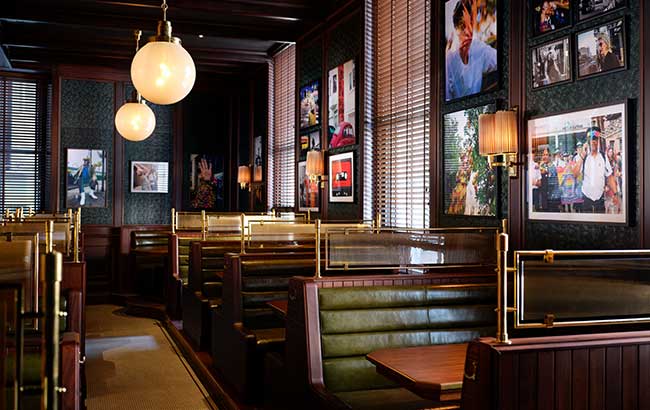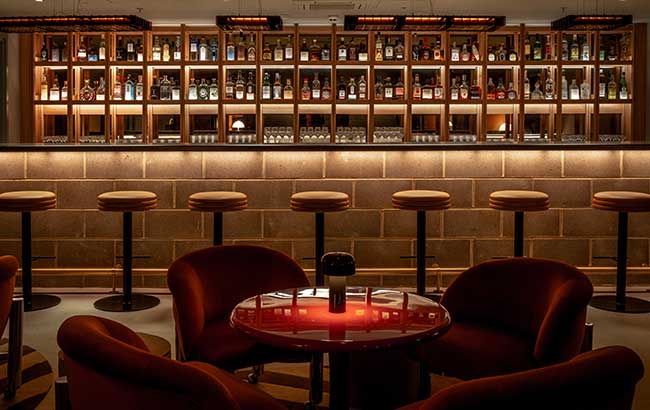Checking in: the new generation of the hotel bar
Having led the way in offering impeccable service for generations, hotel bars are now undergoing a shake-up, with indie operators being invited in to create a new scene.

*This feature was originally published in the May 2022 issue of The Spirits Business magazine.
The hotel bar has long been a bastion of tradition and luxury, conjuring up visions of pristine white gloves and Martini trolleys. But while historic institutions such as London’s Connaught Bar, Dukes Bar and the American Bar at The Savoy continue to draw in drinkers and win accolades, a new generation of hotel bars has entered the scene.
These new venues have swapped the traditional hotel bar aesthetic for unique concepts, an independent style and a focus on accessibility for the local community, bringing a fresh approach to innovation in this sumptuous sector.
Among the most high-profile recent launches exemplifying this trend is Silverleaf, set in the 144-year-old Devonshire House in the grounds of the Pan Pacific hotel in London’s Liverpool Street. To create the venue, Pan Pacific enlisted the team behind whisky retailer Milroy’s.
“From day one, our tagline was ‘the first independent bar in a luxury setting’,” says bar manager Liam Broom, who leads Silverleaf, along with general manager Chris Tanner, also director of bars for Milroy’s.
Pan Pacific gave Broom and Tanner full hiring capabilities and responsibility for the menu direction, resulting in a sleek, “design-led” concept inspired by the five elements from Chinese philosophy. This creative freedom, along with the bar’s physical location “adds to the independent feel”, Broom says.
“We’re in a very fortunate position where Pan Pacific London has the entire plaza, so we’re in a separate building [from the rest of the hotel], with a separate entrance. Pan Pacific London has its own F&B outlets, and so Silverleaf very much feels like a different journey.”
Though hotels don’t typically have an unoccupied historic building going spare for their bar, an increasing number of brands are keen to tap into an independent approach, notes Jason Williams, creative director of bar consultancy Proof Creative, which operates in Asia Pacific.
“Hotels really want to have their bar have its own identity and stand apart from the hotel brand itself. It is certainly a model trend that we’ve seen over the past, say, five-plus years.”
He says this can manifest in a variety of ways: the hotel bar could have a separate social media account or PR company; it could use a different interior designer than the rest of the space; it might not have to adhere to some of the hotel brand’s standards, like glassware or music.
For hoteliers, the appeal of the independently-styled hotel bar is, in many ways, a financial one.

Finding an identity
In cities filled with exciting bars, creating a venue with a unique concept gives hotels a better chance of competing. “If you want people to stay within your walls, and you want the community to come in, you definitely need to do something that is consistent of the quality, and that has its own identity,” says Leo Robitschek, director of food and beverage for Sydell Group, owner of Nomad Hotels.
Last year, Nomad opened its London outpost in Covent Garden, complete with an all-day restaurant and bar called Side Hustle.
The venue draws on two major influences, unique from the rest of the hotel: the British pub, showcased in its panelled walls and leather upholstery; and Nomad chef Ashley Abodeely’s passion for Mexican cuisine, reflected in the food and drinks menu.
The combination has proved successful in making the bar “such a local and industry space”, Rotischek says, noting an 80/20 split between local customers and hotel guests.
“Hotel bars have become more accessible for people,” says hospitality consultant Anna Sebastian. “Maybe 15 or 20 years ago, the average person wouldn’t go into a hotel bar, but now it’s part of drinking culture. And there are new places like Silverleaf and Seed Library opening up with drinks at accessible price points.”
Relaxed atmosphere
The latter bar is the latest from cocktail legend Ryan ‘Mr Lyan’ Chetiyawardana.
Located in the One Hundred Shoreditch hotel in London, Seed Library offers a ‘lo-fi, analogue’ approach to bartending, with most drinks priced under £11.50 (US$15); an eclectic vinyl soundtrack; and a ‘walk-ins welcome’ policy – all elements that make it “a great example of a relaxed atmosphere in a hotel bar setting”, according to Broom.
“Certainly, there seems to be a trend towards more relaxed service,” he continues. “And I think as we come into the post-pandemic world, the conversation is about being more inclusive.”
Though these new venues are striving to create unique concepts, they are built on the legacy of luxury developed by the world’s most iconic hotel bars.
“While focusing on new-wave and lifestyle hotels, it’s important to remember the older hotels that were first,” says Sebastian, herself a veteran of The Savoy and The Langham.
Broom agrees: “Hotel bars, especially in London, have a huge history of great service and of going above and beyond. We would be remiss to remove all the hotel elements from what we’re doing.”
To that end, Silverleaf created a maître d’ role, hiring a specialist to serve as the bar’s host and “maker of memorable moments”.
“It’s the maître d’s job to find out information about guests that we can use to give them above-and-beyond experiences,” Broom explains.
The experiential element is, of course, a calling card for grand dame hotel bars, epitomised by impeccable service and ice-cold Martinis crafted to order tableside.
But the new generation is finding exciting ways to craft these moments too.
Mandarin Oriental’s The Aubrey, with recently opened outposts in Hong Kong and London, offers guests a cocktail omakase in which bespoke drinks are made at an intimate bar counter.
For Atlantis Dubai, Williams says he’s working on an Old Fashioned experience complete with a library of 100 glasses to choose from, as well as five kinds of monogrammed block ice.
“This enhanced level of customisation and personalisation really fits the hotel-bar experience,” explains Williams. “At these five-star hotels, people feel special, and they have all these kinds of exalted experiences. The hotel bar can add to that.”
Related news
The Radicle brings $10 cocktails to Chicago
